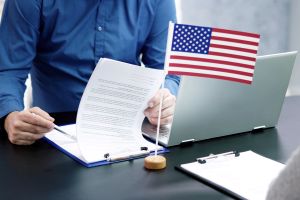If you’re running a business that involves trade between your home country and the U.S., the E-1 Visa can be a great opportunity. It allows you to expand into the American market legally and efficiently. However, many applicants get denied because they don’t fully understand what the government is looking for.
In this guide, we’ll break down the top reasons E-1 Visas get denied—and how to ensure yours isn’t one of them. From paperwork slip-ups to trade volume issues, we’ll cover the common pitfalls and show you how to present a strong, well-documented case, especially if you’re applying from South Texas.
Overview Of The E-1 Visa
The E-1 Visa is a nonimmigrant classification that allows nationals of certain treaty countries to enter the United States to engage in substantial trade. This trade must involve the exchange of goods, services, or technology, carried out primarily between the United States and the treaty country.
Eligibility requires clear, documented proof that over 50% of the international trade conducted by your business is with the United States. The trade must also be continuous, with numerous transactions over time rather than isolated deals.
Additionally, you must hold a key role in the business, such as an executive or supervisor, whose presence in the U.S. is essential to operations. Understanding these baseline requirements is critical. Failing to meet even one of them can result in a denial.
Common Reasons For E-1 Visa Denials
Even applicants with basic qualifications can face denials if the supporting evidence is unclear, inconsistent, or incomplete. Applicants in South Texas, where regional trade dynamics can add complexity layers, must be diligent. Below are the most common reasons E-1 applications are refused, and why these issues frequently surface.
Insufficient Substantial Trade
“Substantial trade” refers to the volume and continuity of international transactions. Many applicants underestimate what is required, providing only a handful of invoices or relying on a small number of high-value transactions.
Officers expect to see consistent activity over time. Sporadic or irregular trade, regardless of transaction size, may signal that the enterprise lacks the ongoing engagement required for E-1 status.
Lack Of Principal Trade With The U.S.
To qualify, at least 50% of the international trade must be between the United States and your treaty country. Applications often fall short here, mainly when businesses operate globally and the U.S. accounts for a smaller share of overall activity.
You must present data that clearly illustrates the proportion of trade conducted with the U.S. This is non-negotiable, and failure to do so is a frequent cause of rejection.
Incomplete Or Incorrect Documentation
Errors in documentation are one of the most preventable reasons for denial. Missing contracts, untranslated financial statements, or inconsistent business names across documents can raise doubts about the legitimacy or preparedness of the applicant.
Reviewing every submission for accuracy, consistency, and completeness is essential. Oversights, even minor ones, can delay or derail the process entirely.
Inadequate Evidence Of Ongoing Trade
Consular officers look for proof that trade is active and sustained. Those who submit outdated records or show significant gaps between transactions risk being viewed as inactive or non-operational.
Clear, chronological records of trade activity are crucial. These include shipping documents, payment confirmations, and ongoing client relationships. Such documentation is vital to demonstrate sustained commercial engagement.
Failure To Demonstrate An Essential Role
You must play a critical role in the company’s trade operations. Submitting an application without showing how your duties influence business success often leads to denial. Whether in a managerial, executive, or specialized capacity, your involvement must be indispensable, not merely supportive or symbolic.
Understanding why applications are denied is only half the battle; the next step is building a stronger, more compelling case. Applicants who adopt proactive strategies tailored to the E-1 criteria can significantly improve their chances of success.
Strategies To Avoid Application Denials
Avoiding an E-1 Visa denial starts with understanding what officers look for—and then over-delivering in those areas. Here are the core strategies that help reduce the risk of denial and improve the strength of an E-1 submission.
Organize & Present Strong Documentation
Clear documentation is the backbone of a successful E-1 petition. Each contract, invoice, and transaction record should be organized to demonstrate ongoing trade and highlight the U.S. as the principal partner.
Use summaries, indexes, and visual data representations if needed. Well-organized records make it easier for officers to understand and verify the legitimacy of the business relationship.
Prove Substantial & Principal Trade
The volume and frequency of trade must be clearly shown, with documentation that reflects recent activity. You should include profit-and-loss statements, shipping logs, and trade breakdowns showing the percentage of transactions conducted with the U.S.
When multiple countries are involved in trade, isolating U.S. data in a separate section will help confirm that the U.S. is the primary partner. Vague or mixed data invites scrutiny.
Double-Check For Legal Consistency & Accuracy
Ensure all forms, business records, and identification details match precisely. Even slight inconsistencies, such as mismatched addresses or business names, can lead to delays or suspicion.
You should have your documentation reviewed by a qualified immigration attorney to minimize risk. Legal precision sends a strong signal of credibility.
Seek Legal Representation
Working with an immigration attorney experienced in E-1 Visas can make a significant difference. They understand what consular officers prioritize and can help applicants anticipate questions before they arise.
Even with the best strategies in place, applicants often have lingering concerns about the reasons behind E-1 Visa denials. Understanding these frequent issues, beyond documentation errors or trade volume, can offer valuable insight into how to tailor a stronger application.
Your E-1 Visa Questions Answered
The E-1 Visa process can be highly technical, and many applicants have recurring questions about eligibility, documentation, and timelines. Understanding the finer points of this Visa category is essential to building a stronger application and avoiding preventable errors. Below are some of the most common concerns prospective E-1 Visa applicants raise.
What Qualifies As “Substantial Trade”?
Substantial trade refers to an ongoing volume of international trade sufficient to justify the trader’s or employee’s presence in the United States. This is not defined solely by dollar value but rather by the frequency and continuity of trade transactions over time.
A single significant transaction is not enough. Multiple exchanges of goods or services, well-documented and directly tied to the U.S. market, are required to meet this standard.
Can Trade With Countries Other Than My Home Country Be Counted?
For an E-1 Visa, more than 50% of the applicant’s international trade must be exclusively between the United States and the applicant’s treaty country. Trade conducted with third-party countries does not count toward this requirement.
Failure to demonstrate this principal trade relationship is one of the most common reasons for denial. The burden of proof lies entirely with the applicant and must be well-supported with clear, itemized evidence.
How Long Does The E-1 Visa Application Process Typically Take?
Processing times vary depending on the U.S. consulate or embassy where the application is filed and the case’s complexity. In general, it may take several weeks to a few months to receive a decision.
Factors such as administrative processing, incomplete submissions, or consular backlogs may extend the timeline. For this reason, it is strongly recommended that applicants begin preparing their documentation as early as possible.
Given the process’s complexity and high evidentiary standards, many find that working with a knowledgeable immigration law firm offers a significant advantage. An experienced legal team can help clarify eligibility requirements, organize trade documentation, and navigate consular procedures.
Lozano Law Firm Helps South Texas Traders Succeed
At Lozano Law Firm, we are dedicated to helping traders, entrepreneurs, and investors from South Texas and beyond confidently navigate the E-1 Visa process. With deep roots in the border region, we understand local applicants’ unique challenges when pursuing international trade opportunities in the United States.
Our legal team brings a focused, strategic approach to each case, emphasizing accuracy, preparation, and clear communication. We work closely with clients to build strong applications highlighting substantial trade, legal compliance, and the applicant’s vital role in their enterprise.
Every case receives personal attention and customized support. From initial consultation to final submission, we stay committed to your success.
Whether expanding your business or securing a long-term U.S. presence, our experience in treaty trader Visas gives your case the edge it needs. Lozano Law Firm stands ready to guide you because your business goals deserve nothing less than a powerful legal partner.
Securing an E-1 Visa requires more than basic qualifications—it demands clear documentation, strategic planning, and a strong understanding of trade requirements. Many denials result from avoidable errors such as weak evidence, incorrect filings, or lack of legal guidance.
Regional trade dynamics can make the process even more complex for South Texas applicants. Lozano Law Firm provides experienced legal support designed to address these challenges. They assist clients in presenting stronger, more comprehensive applications, giving businesses the foundation to thrive in the U.S. market.





